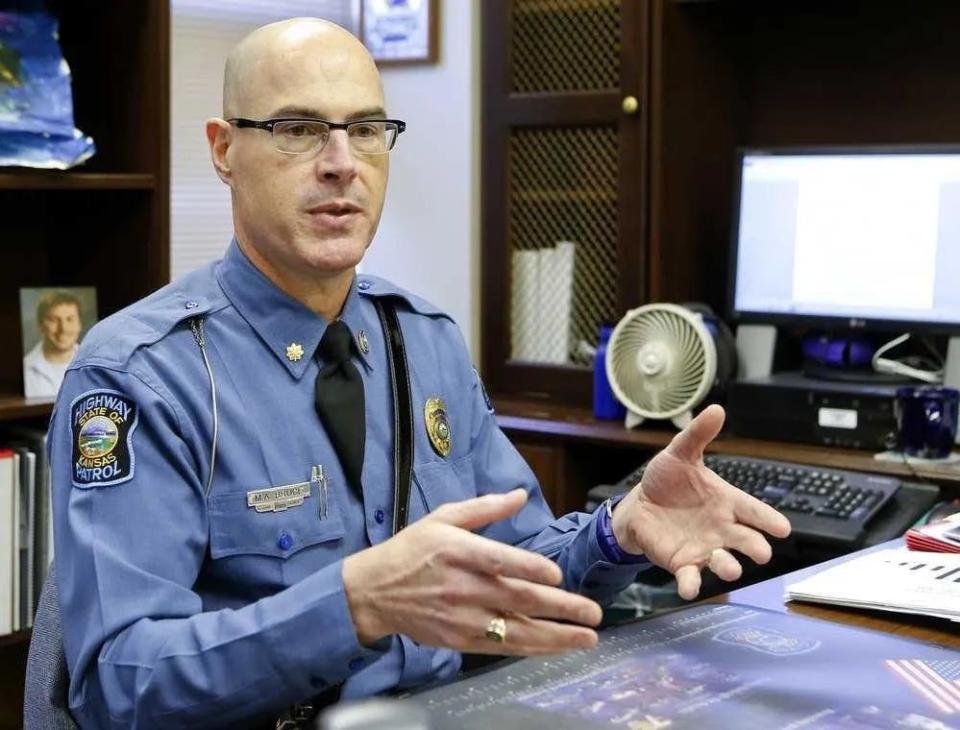Jury concludes ex-Kansas Highway Patrol leader was coerced into resigning
- Oops!Something went wrong.Please try again later.
Former Kansas Highway Patrol superintendent Mark Bruce was coerced into resigning against his will, an advisory jury concluded late Friday morning.
U.S. District Court Judge Daniel Crabtree, who has final say in the lawsuit involved, issued no ruling but indicated that attorneys representing Bruce and the defendants — Gov. Laura Kelly and KHP superintendent Erik Smith — would need to submit to him written documents sharing arguments regarding unresolved questions.
Those include how much Bruce should be compensated and when his reinstatement to his former rank of major should take, or have taken, effect.
Though the vote was 6-1, which wasn't the unanimous verdict Crabtree had asked jurors to reach, attorneys for both sides had agreed Thursday they would be willing to accept a 6-1 verdict.
Brianna Johnson, Kelly’s communications director, said in a statement, "We thank the jury for its advisory decision and will wait for the court's order."
Jurors in Kansas Highway Patrol case deliberated for more than 11 hours
Crabtree exercised his option of impaneling an "advisory jury" to advise him as to whether members thought Bruce resigned voluntarily or was coerced.
Bruce asked for a jury trial, but federal law requires the consent of all parties for that to happen with claims that seek "prospective equitable relief" — which Bruce's does — and the state didn't consent to a jury trial, Crabtree said in a Jan. 5 court order.
Advisory jurors after hearing testimony this week deliberated more than than 11 hours, starting Wednesday afternoon. The jury initially included eight people, but one was removed during deliberations after testing positive for COVID-19.
Jurors told Crabtree late Thursday afternoon they were unable to reach a unanimous verdict. They said they were divided 6-1. At Crabtree's direction, they didn't say in whose favor.
Attorneys representing the two sides told Crabtree they would be willing to accept a 6-1 verdict if the jurors were unable to reach a unanimous decision Friday.
Jurors then told Crabtree shortly after 11 a.m. Friday that they were convinced further deliberation wouldn't result in a unanimous verdict.
What are the facts of the case?
Friday was the fifth day of the trial in Bruce's civil suit against Kelly and Smith, whom he is suing in their official capacities.
Crabtree directed advisory jurors Monday to decide if Bruce resigned voluntarily or was coerced into resigning, therefore effectively being terminated.
If Bruce was coerced, he is entitled to be restored to the major's rank he held before becoming superintendent, Crabtree said.
If Bruce resigned voluntarily, Kelly didn't violate his due process rights, Crabtree wrote in a court order issued Jan. 5.
Bruce alleged his right to due process was violated when he resigned as superintendent in 2019 because he wasn't given an option of being terminated as superintendent and returning to his prior rank as a major.
Bruce felt he had no other choice after being told he would be terminated, returned to an unclassified major's position — which wouldn't provide him Civil Service employment protection — then dismissed from that job during his probationary period, said one of his attorneys, Alan Johnson.
Johnson noted that a document provided to Bruce by Will Lawrence, Kelly's chief of staff, initially called what happened a "dismissal" before that word was changed to "resignation" at Bruce's request.
Attorney David Cooper, representing Kelly and Smith, countered that Bruce chose voluntarily to resign and retire with full benefits and no termination on his record to enter a workforce where he was still young and employable.
The Kansas Supreme Court, after considering the matter at Crabtree's request, ultimately ruled in 2022 that anyone holding the rank of major is in fact a classified worker, adding that an officer who returns to that position from superintendent doesn't have to serve a probationary period.
Bruce was among witnesses who testified at this week's trial. His attorneys attempted to have Kelly subpoenaed, but Crabtree issued an order quashing that.
Kelly's testimony wasn't absolutely needed to resolve any of the questions involved, Crabtree said.

What got us to this point?
Bruce, who had been with the KHP since 1989, resigned March 28, 2019, amid allegations he mishandled KHP sexual misconduct and domestic violence scandals.
Bruce filed a three-count lawsuit in January 2020 against Kelly; Kelly's chief of staff, Will Lawrence; and Herman Jones, who replaced Bruce as superintendent of the KHP.
Crabtree in December dismissed two of those claims. They alleged Lawrence violated Bruce's constitutional right to due process and engaged in tortious interference with a prospective business relationship.
The remaining count, which jurors heard this week, contended Bruce's constitutional right to due process was violated.
Contact Tim Hrenchir at threnchir@gannett.com or 785-213-5934.
This article originally appeared on Topeka Capital-Journal: Jury decides former Kansas Highway Patrol leader was forced to resign

